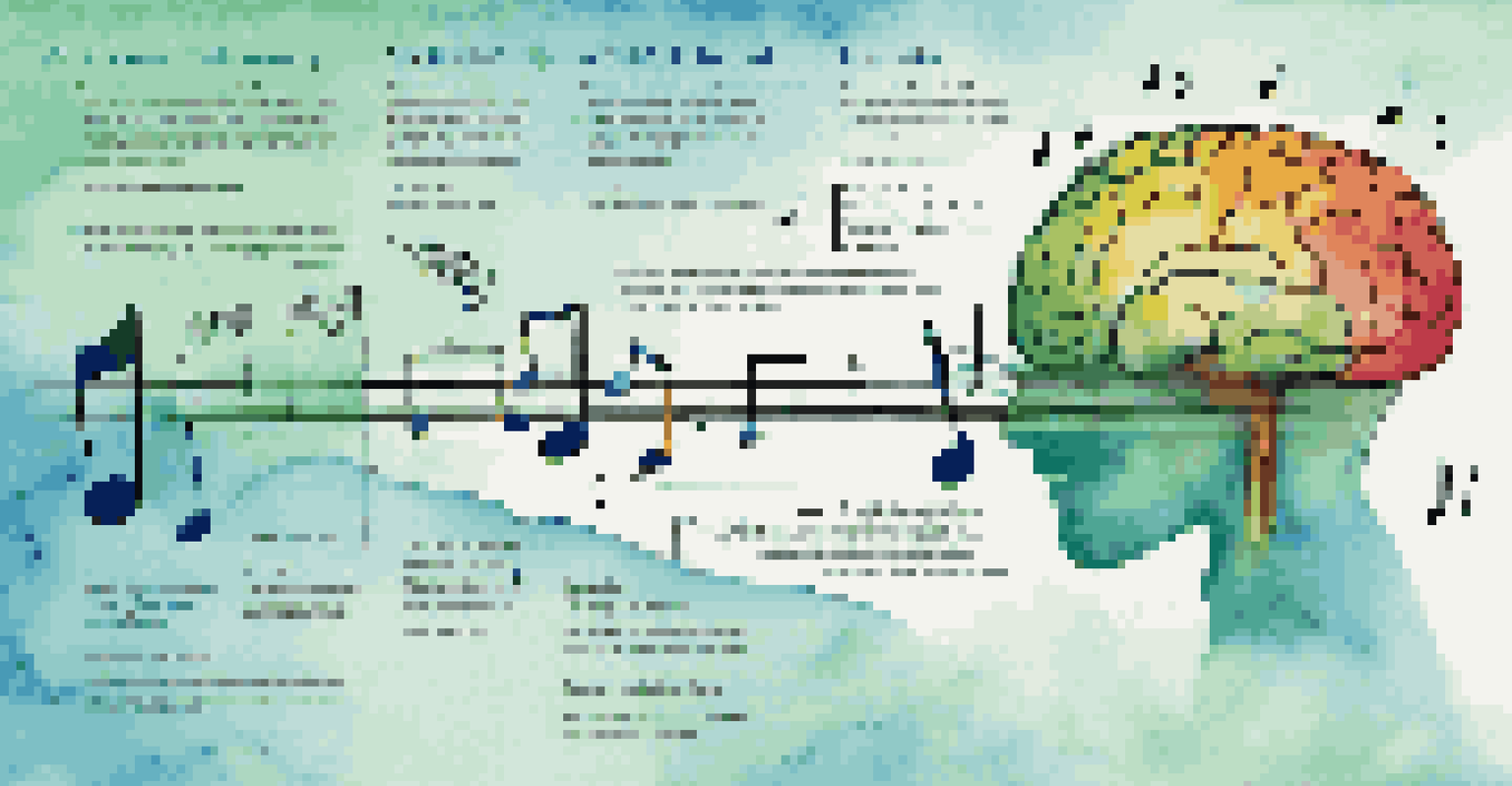Music's Role in Enhancing Memory for Individuals with ADHD

Understanding ADHD and Memory Challenges
ADHD, or Attention-Deficit/Hyperactivity Disorder, affects many individuals, causing difficulties in focusing and retaining information. These memory challenges can manifest as forgetfulness, trouble following instructions, or difficulty organizing thoughts. Understanding this can help tailor strategies that enhance memory retention, making daily tasks more manageable.
Music can change the world because it can change people.
Individuals with ADHD often experience a scattered thought process, which can lead to frustration when trying to remember important details. This is where music can step in as a useful tool, providing a structured and engaging way to boost cognitive functions. By exploring the connection between music and memory, we can uncover effective methods to support learning.
Research suggests that music can stimulate brain regions involved in memory and attention. For those with ADHD, incorporating music into study routines or daily activities might be the key to unlocking better focus and memory retention.
The Science Behind Music and Memory
Studies show that music activates multiple areas of the brain, including those responsible for memory and emotion. This multi-faceted engagement helps reinforce learning and recall, making music an excellent aid for individuals with ADHD. When a particular song is associated with a memory or task, it can serve as a mental anchor during recall.

For instance, consider how jingles and songs can help us remember information, like the alphabet song we all learned as kids. This phenomenon occurs because melodies make information more memorable, creating a rhythm that our brains can easily latch onto. For someone with ADHD, this method can transform mundane tasks into enjoyable activities that enhance retention.
Music Enhances Memory for ADHD
Incorporating music into study routines can significantly improve memory retention and focus for individuals with ADHD.
Moreover, the emotional aspect of music can also play a significant role. Music that evokes positive feelings can create a conducive environment for learning, reducing anxiety and increasing motivation, which are often challenges for those with ADHD.
Types of Music That Aid Memory
Not all music is created equal when it comes to memory enhancement, especially for individuals with ADHD. Generally, instrumental music or tracks with minimal lyrics are recommended. This is because lyrics can be distracting, pulling attention away from the task at hand.
The only thing better than singing is more singing.
Genres like classical, ambient, or soft electronic music often provide a soothing backdrop that helps maintain focus and reduce anxiety. For example, listening to Bach or Mozart while studying can create an ideal atmosphere for learning without overwhelming the senses.
It's essential to note that personal preference plays a significant role in this process. What works for one person might not work for another, so it’s worth experimenting with different styles to find the most effective musical accompaniment.
Creating a Music-Based Study Routine
Establishing a routine can significantly enhance the efficacy of music as a memory aid. For individuals with ADHD, consistency is key; creating a specific study schedule that includes music can help establish a mental connection between the activity and the tunes. This routine can include specific genres or playlists chosen for different tasks.
For instance, starting each study session with the same playlist can signal to the brain that it’s time to focus. Over time, this association can help improve concentration and retention of information, creating a more effective learning environment.
Rhythm and Movement Aid Learning
Using rhythmic patterns and incorporating movement while listening to music can help break down complex information and enhance recall.
Additionally, using music during breaks can also be beneficial. Short musical interludes can provide a refreshing pause, allowing the brain to rest before diving back into the material. This balance between study and relaxation can enhance overall productivity.
The Role of Rhythm and Repetition
Rhythm and repetition are two powerful elements in music that can greatly aid memory. Repetitive beats can create a sense of predictability, which is comforting for individuals with ADHD. When the brain knows what to expect, it can focus more on the task at hand rather than being distracted by uncertainty.
Moreover, rhythmic patterns can help break down complex information into digestible chunks. For example, setting study material to a simple beat can help in memorizing lists or formulas, making the learning process more enjoyable and effective.
This technique can be especially helpful when trying to memorize sequences, like vocabulary words or historical dates. By turning these sequences into a rhythmic pattern, individuals with ADHD may find it easier to recall the information when needed.
Incorporating Movement with Music
Another engaging way to enhance memory through music is by incorporating movement. Dance or simple physical activities while listening to music can stimulate brain function and improve focus. This not only makes learning more enjoyable but also helps to release excess energy, which is often a challenge for individuals with ADHD.
Think about how children often learn better when they can move around—this concept applies to adults too. For instance, studying while standing or pacing can keep energy levels up and attention focused, especially if accompanied by a favorite tune.
Personalized Music Strategies Work
Experimenting with different music styles and creating themed playlists can tailor the learning experience for individuals with ADHD.
Furthermore, movement can help reinforce memory through physical associations. For example, if someone dances while studying a particular subject, the body’s movements can create additional memory cues that enhance recall later.
Real-Life Success Stories and Tips
Many individuals with ADHD have successfully harnessed the power of music to improve their memory and focus. For example, a college student might find that listening to classical music while studying for exams helps them retain information better than silence. These personal experiences highlight the practical applications of music in everyday life.
Sharing tips from those who have benefited can inspire others to try similar strategies. Simple practices like creating themed playlists for different subjects or using music as a reward after completing tasks can make a significant difference in productivity.

Ultimately, the key is to remain open-minded and experiment with different musical approaches. Each person's journey with ADHD is unique, and finding the right musical strategy could unlock their potential for improved memory and focus.